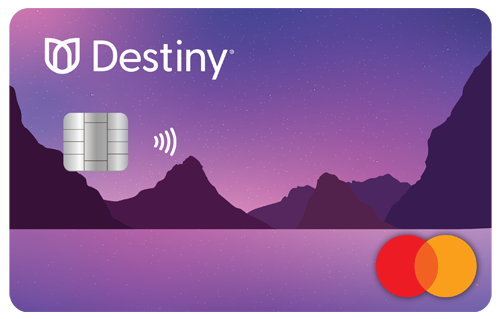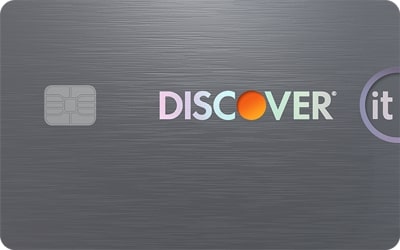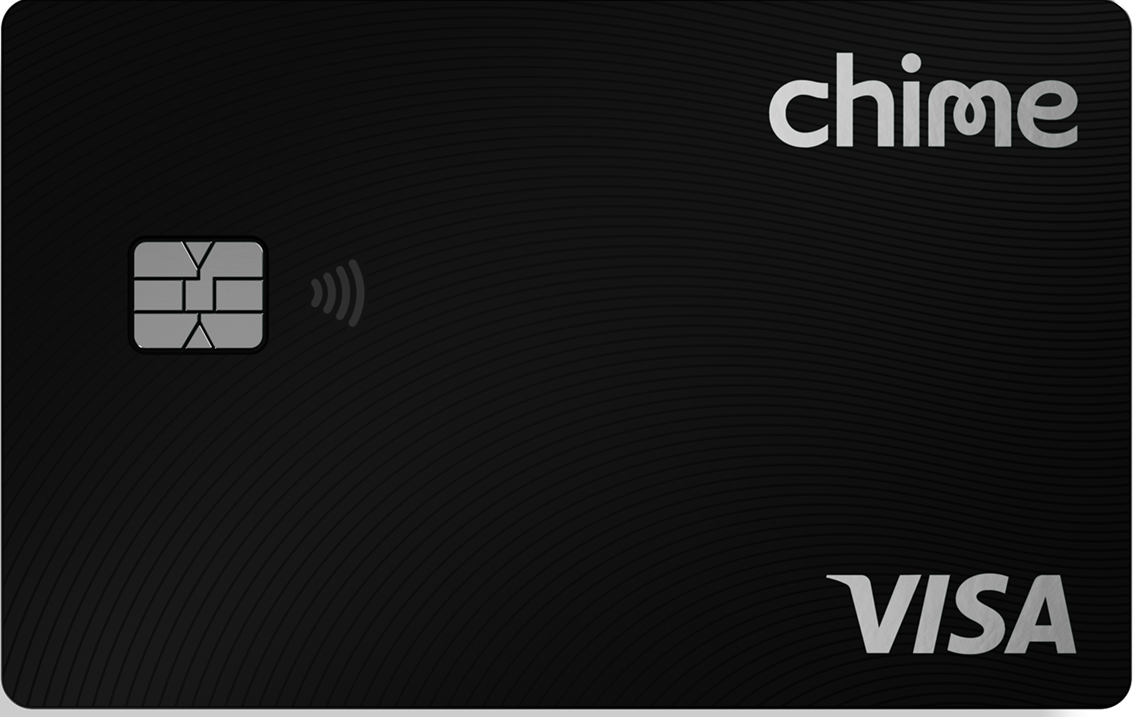Destiny Credit Card: Many Fees, Few Benefits
The Bottom Line
1.5
Even if you have less-than-perfect credit, you don’t have to settle for the Destiny Mastercard® with its absurd fees and interest rate.

Rates, fees and offers
Rates, fees and offers
Annual fee
See terms
Rewards rate
N/A
Bonus offer
N/A
Ongoing APR
APR: See Terms
Foreign transaction fee
1% of each transaction in U.S. dollars.
More details from The Bank of Missouri
More details from The Bank of Missouri
- All the benefits of a Mastercard, without a security deposit
- 24/7 access to your account, even on mobile!
- Reports to all three major credit bureaus
- Less than perfect credit is okay, even with a prior bankruptcy!
Pros and Cons
Pros
No security deposit
Reports to all 3 credit bureaus
Qualify with bad credit
Cons
Annual fee
Monthly fee
High APR
Small credit limit
Detailed Review
Applying for the Destiny Mastercard® is a bit like tempting fate: It does have some credit-building features, but it's far more expensive than other credit cards for bad to average credit (typically, FICO scores of 689 or lower).
The card’s annual fee is as much as $175, while the annual percentage rate, or APR, is 35.9% as of this writing — outrageous numbers considering that the card offers few perks to offset those costs.
Even if you have bad credit, you're not doomed to products like the Destiny Mastercard®. You can find plenty of secured credit cards and alternative cards that charge low or no annual fees and may even earn rewards.
The Destiny Mastercard® is one of multiple cards — including the Milestone® Mastercard® and Indigo card — serviced by Concora Credit and targeting those with bad credit. They tend to share the same value proposition: use of a credit card in exchange for a slew of fees. Check out our guide to all of the Concora cards here. Although serviced by Concora, the Destiny Mastercard® is actually issued by the Bank of Missouri (prior to April 2025, it was issued by First Electronic Bank).
Destiny Mastercard®: Basics
Card type: Fair credit.
Annual fee: As of December 2023, according to the card's website, the annual fee is $175 in year one; after the first year, the fee is $49.
Monthly fee: Up to $12.50 each month ($0 the first year).
Sign-up bonus: N/A.
Rewards: None.
APR: As of December 2023, according to the website, the purchase APR was 35.9%.
Foreign transaction fee: 1%.
Compare to Other Cards

Benefits and Perks
Accessibility
The Destiny Mastercard® is relatively easy to qualify for with limited or bad credit or even a prior bankruptcy. And because the Destiny Mastercard® is an unsecured card, you won't need to tie up hundreds of dollars in a security deposit to open the account.
You do need to be at least 18 years old and have a valid Social Security number.
Credit bureau reporting
The Destiny Mastercard® reports to the three major credit bureaus, Equifax, Experian and TransUnion. If you use the card responsibly — keeping your utilization rate below 30% and paying balances in full every month, for example — your credit scores will likely get a lift.
After doing the hard work of building your credit, treat yourself by getting a better card with fewer fees and more robust perks.
If you want to cancel the card, you’ll need to notify the issuer. Simply removing the card from your wallet and not using it anymore isn’t enough. If the Destiny Mastercard® is active but not in use, you’ll still incur the annual and monthly fees.
Drawbacks and Considerations
High annual fee
You’ll pay $175 in the first year of using the Destiny Mastercard®, an absolutely ridiculous amount considering that it doesn’t earn rewards or offer perks like cell phone insurance. The annual fee drops to $49 in subsequent years, but that amount is still high compared with other cards that don’t charge a cent.
Plus, the Destiny card’s annual fee is assessed upon account opening, which immediately reduces the amount of available credit.
As of December 2023, there are seven versions of the Destiny card in addition to the one offered on NerdWallet’s website. The cards differ in terms of the amount of annual fees, monthly fees and overlimit fees; APRs; and credit limits.
You can get the annual fee back if you close the account and haven’t made any transactions with the card. Just note that canceling a credit card can have implications for your credit scores. (There is no upgrade path to another Destiny card with no annual fee.)
Regardless, paying an annual fee for a credit card doesn’t have to be your destiny, especially if you can come up with a security deposit (which, unlike an annual fee, is refundable). The Capital One Platinum Secured Credit Card and Discover it® Secured Credit Card are some of NerdWallet’s highly rated cards with no annual fee.
Overlimit and monthly fees
It's not surprising to find annual fees on unsecured credit cards for bad credit. What raises an eyebrow, though, is that you may also owe overlimit and monthly fees, which make the Destiny Mastercard® even more expensive to hold.
Overlimit fees are largely extinct, but among the vanishingly small number of issuers that still feature them, they're the price cardholders pay in exchange for the ability to charge beyond a card’s credit limit. For the Destiny Mastercard®, it's an opt-in feature with a fee that can be as much as $41. However, the card’s terms and conditions state that transactions that put you over the credit limit may still be refused, even if you've enrolled in overlimit coverage. You could end up paying for something without reaping its benefit.
A monthly fee is another indignity you’ll endure if you have the Destiny Mastercard®. As the name suggests, this fee is assessed every month for the “privilege” of using the credit card. The Destiny Mastercard® waives the fee in the first year, but after that, it charges $12.50 a month, or $150 a year. These monthly fees are on top of the annual fee.
Overlimit and monthly fees are the exception, not the rule, so you won’t have to look hard for a card without them. None of the cards on our list of best credit cards for bad credit charge them.
High interest rate
As of December 2023, the purchase APR on the Destiny Mastercard® is 35.9%. Balances that aren’t paid off by the due date will be charged this interest rate, making it extremely costly to revolve a balance. If you have this card, try to pay it off in full every month to prevent your debt from swelling.
Small credit limit
The maximum credit limit on the Destiny Mastercard® is $700, a fairly small amount that’s whittled down by the annual fee. After the $175 annual fee is charged to the account, you’ll be left with just $525 worth of spending power. So before you’ve made a single transaction of your own, your credit utilization ratio — the percentage of available credit you're using — is already at 25%. High utilization rates tend to correlate with lower credit scores.
Other credit cards for bad or no credit extend higher credit limits and don’t charge an annual fee. The maximum credit limit on the Varo credit card, for example, is $10,000 per billing cycle.
How To Decide If It's Right For You
If you like paying a lot of money and getting very little in return, the Destiny Mastercard® is a great pick.
For everyone else, the Destiny Mastercard® should be at the very bottom of the list of credit options. This card wants you to believe that you have to pay a lot of money in order to build a credit history, and that’s simply not true. We recommend getting one of our top-rated secured cards if you need help mending or building credit, but if you can’t swing the upfront security deposit, check out our list of alternative credit cards instead.
Choose your own security deposit amount
There's no credit check and you get to choose your own security deposit amount. You can only spend as much as you deposit. This card does have some requirements, but they may be easier to meet than the steep security deposit required by some secured cards. Terms apply.
Looking For Something Else?
Methodology
NerdWallet reviews credit cards with an eye toward both the quantitative and qualitative features of a card. Quantitative features are those that boil down to dollars and cents, such as fees, interest rates, rewards (including earning rates and redemption values) and the cash value of benefits and perks. Qualitative factors are those that affect how easy or difficult it is for a typical cardholder to get good value from the card. They include such things as the ease of application, simplicity of the rewards structure, the likelihood of using certain features, and whether a card is well-suited to everyday use or is best reserved for specific purchases. Our star ratings serve as a general gauge of how each card compares with others in its class, but star ratings are intended to be just one consideration when a consumer is choosing a credit card. Learn how NerdWallet rates credit cards.
About the author

Jae Bratton
Lead Writer & Content Strategist



